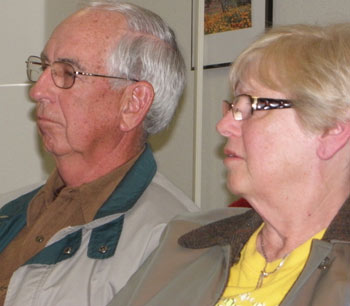BY LINDA BENTLEY | APRIL 18, 2012
Freeman seeks TRO against Sorchych, town and Cahava Springs
Freeman asserts the town has used the roadway easement on Cahava’s property without Freeman’s permission
 CAVE CREEK – On April 13, Gerald and Janice Freeman (r) filed yet another action against their neighbor Don Sorchych, publisher/editor of Sonoran News, only this time they’ve dragged in the town and Cahava Springs Corp.
CAVE CREEK – On April 13, Gerald and Janice Freeman (r) filed yet another action against their neighbor Don Sorchych, publisher/editor of Sonoran News, only this time they’ve dragged in the town and Cahava Springs Corp.
The photo exhibits attached to the complaint/application for declaratory judgment, injunctive relief and temporary restraining order (TRO) were taken by Gerald Freeman the day he ran his truck into the back of a mule whose rider was on an easement on land owned by others that the Freemans use to access their property.
Sonoran News learned Tuesday the Maricopa County Attorney’s Office has declined to press charges against Freeman for his actions.
After Sorchych deeded property on which a potion of the easement lies as a gift to the town, Freeman threatened to sue the town. The town responded by rescinding the action and deeding it back to Sorchych.
Well, it looks like the town is getting sued anyway.
According to Freeman, the easement across Cahava Springs’ property, which both Sorchych and the Freemans must use to access their property, is exclusively for ingress and egress to their property.
Further, Freeman claims he and his wife have not given the town permission to use the roadway easement, none of which is on their property, and it’s his belief Sorchych, whose property the easement does traverse, has not given the town permission to use the roadway easement.
However, the complaint states if Sorchych “has given or attempted or attempts to give permission to any third party, including the town, to use the roadway easement, this complaint will be amended accordingly."
Freeman states he has paid for all roadway maintenance on the easement since 1991 and Cahava, Sorchych and the town have not contributed toward that maintenance. He notes he is currently in a lawsuit against Sorchych seeking contribution for roadway maintenance.
Sorchych purchased his property with a primitive road and prefers to keep it that way. He either performs road maintenance himself or hires others as necessary.
The easement, which provides the only method of legal access to their homes, is described as “… an easement for an existing roadway as it existed on Oct. 2, 1969 …”
While the road was quite primitive in 1969, Freeman wants a substantially improved roadway and wants Sorchych to contribute toward those improvements he neither needs nor wants.
There’s never been any sort of maintenance agreement and Sorchych doesn’t wish to be party to one, especially with the Freemans who have been suing him now for six years.
There was no law in Arizona mandating property owners to enter into cost sharing for road maintenance, until the Arizona Court of Appeals legislated from the bench in Freeman’s suit, ordering Sorchych to contribute because it was the equitable thing to do.
While that case was still pending, Freeman enlisted Sen. Nancy Barto, R-Dist. 7, to try to sneak through such legislation.
Those efforts failed, however, after the real estate community caught wind of it and realized the detrimental effect it would have on property owners throughout rural Arizona.
Freeman notes in his complaint that both the Freemans and Sorchychs are the only consistent roadway easement users and claims all other uses are at their discretion.
Meanwhile, Cahava granted the town permission to use its property to create a horse trail and granted the town permission to survey the location for the horse trail.
Freeman asserts the town has used the roadway easement on Cahava’s property without Freeman’s permission, which Freeman claims has “unreasonably interfered with Freemans’ use.”
Freeman also claims Cahava has no legal ability to grant permission to a third party, including the town, to use the easement which is on Cahava’s property.
Because the Freemans believe Cahava has no right to the use of the easement on its own property, Freeman served the town with a “Notice of Trespass.”
The complaint claims, “The Freemans have a definite interest, as successors in interest of the Granto, in their right to the enjoyment and use without interference from Cahava, the town, the public, Sorchychs, and all other persons from using the easement for any purpose, and asserts, “Cahava has denied the Freemans of their right to exclusive use of their driveway which is located upon the exclusive easement.”
The Freemans are seeking a restraining order to enjoin each of the defendants “from entering upon and/or from trespassing upon the easement,” which, as stated, means he is also seeking to enjoin the Sorchychs from having access to their own property.






